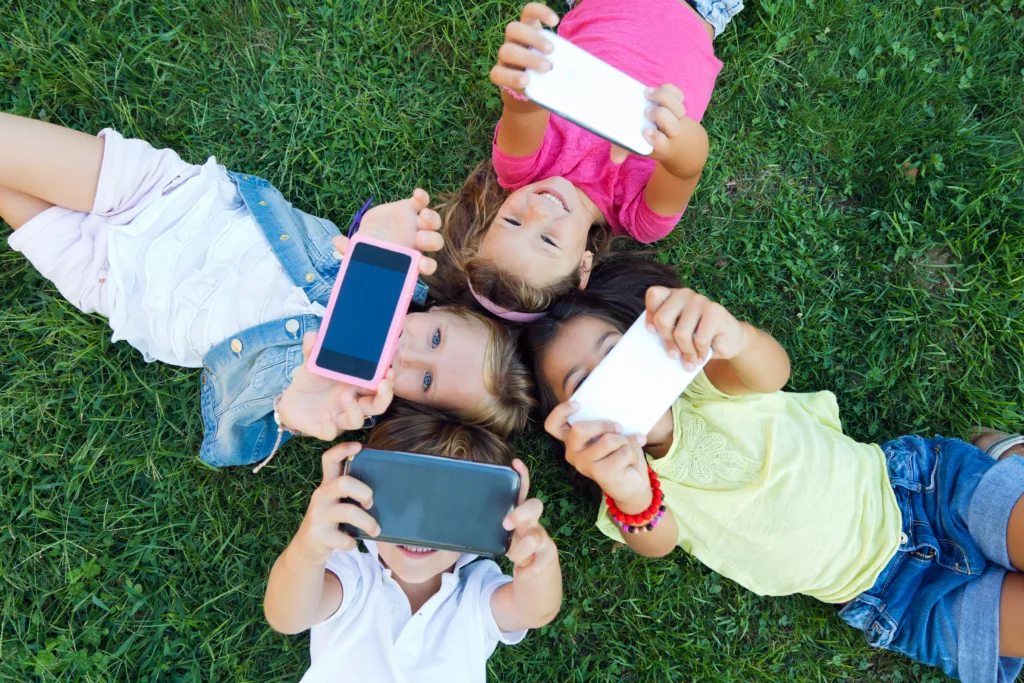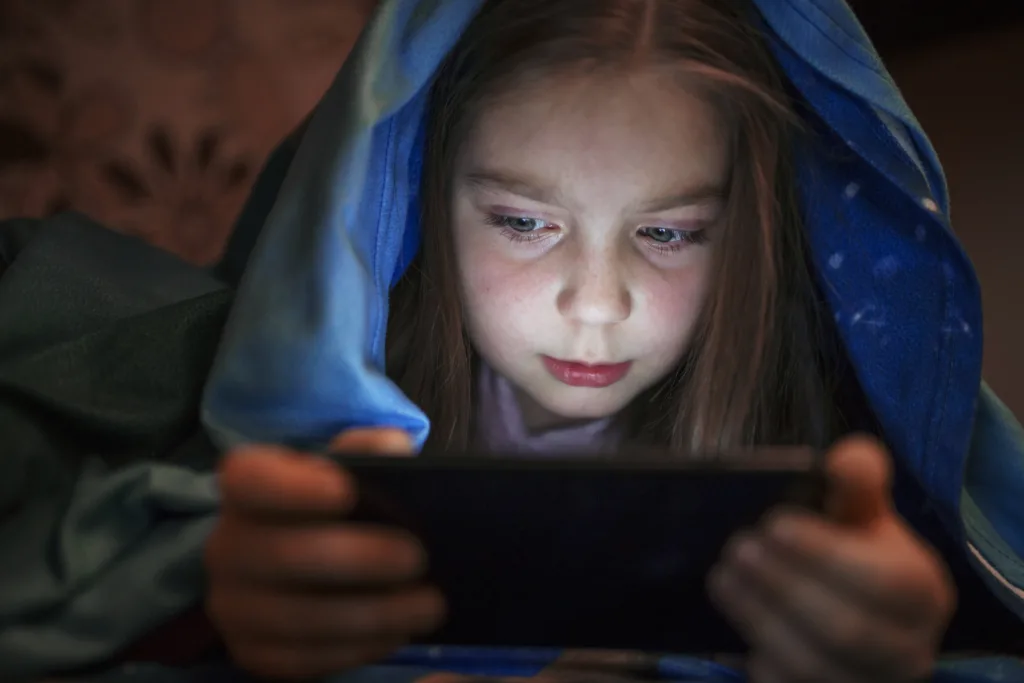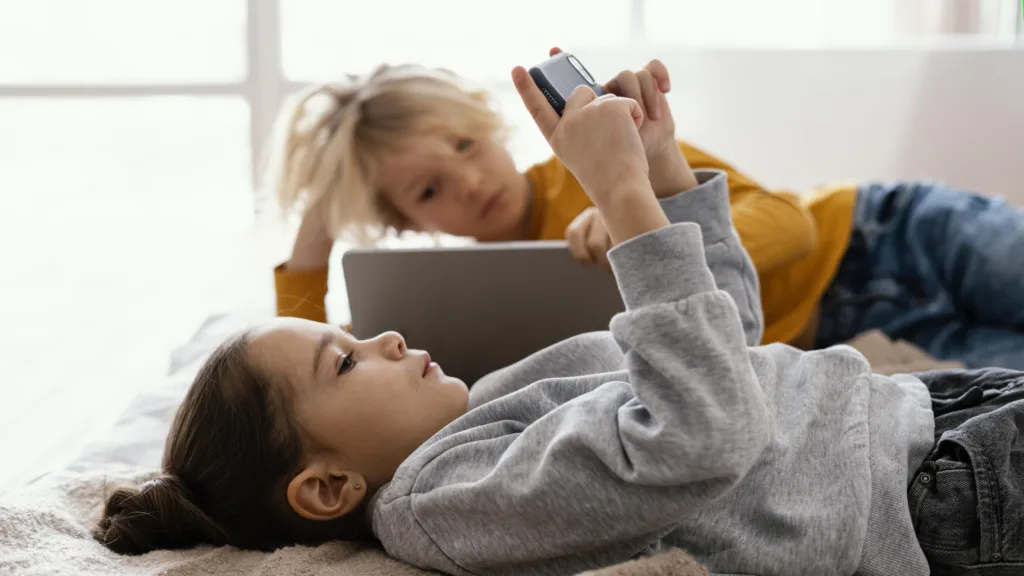Ensuring online safety for children has become a pressing concern. In the age of smartphones, social media, online gaming, apps, and e-learning, should we be worried as parents? Why is social media bad for kids? Recommendations either focus on recognizing the benefits of making our kids tech-smart or severely mitigate the risks of using social media platforms. Very few sources give practical solutions and leave information open to interpretation. This article aims to provide insights into creating this balance and promoting healthy digital habits among children while highlighting the potential threats.
Social Media Effects on Kids
Our children are becoming digital natives. They are exploring, learning, and communicating through a vast array of online platforms. While these digital spaces offer some benefits, they also present unique challenges and potential hazards. According to The American Academy of Pediatrics (AAP), parental guidance is essential in establishing children’s healthy interaction with technology. Is social media good for kids? Let’s look at the brightside first.
Positive Effects of Social Media on Children
- Open access to educational resources
Social media’s reach extends far beyond memes and following trends. It also serves as a channel for open access to educational resources. When information became widely available and mostly free, education was democratized. Students all over the world can tap into a wealth of knowledge. They can be selective and learn at their own pace. Whether mastering a new language or exploring the depths of quantum physics, social media offers a virtual library at our fingertips.
- Keeping us connected

Credit: Freepik
We were able to witness that socializing at a distance is feasible. During the pandemic, when physical distancing became the norm, platforms like TikTok and Snapchat have transformed how we interact with others. We created online communities united by shared interests or experiences. These social networking platforms provided a vital lifeline, keeping people connected and engaged.
- Self-expression and access to a global community
Social media platforms are not only information-sharing hubs when looking for potential and benefits. They’re spaces for personal growth and self-expression, particularly among adolescents and young people. They provide a virtual stage where teens can express their thoughts, share their creativity, and voice their concerns. Children can share their perspectives with an audience that spans continents and engage in meaningful discussions. These experiences, while fostering a sense of global citizenship, are known to be self-esteem and confidence enhancers.
- Promoting technology literacy
Social networking has incredible potential to enhance communication skills and technological literacy. It introduces children to technology’s intricate world, driving them to become tech-savvy from a young age. This is particularly evident among young children who use social media to supplement their school work, pursue their hobbies, and explore creative outlets.
Is social media good for kids when it helps them expand their knowledge and abilities? We believe it is.
👉 Discover the key to balanced screen time for your kids! Read the article, ‘Should Parents Limit Screen Time? How to Avoid Turning Screens into “the Babysitter,” for essential insights.
Why is Social Media Bad for Kids: Negative Effects of Social Media on Children
So, with all these benefits, why is social media bad for kids after all? Why aren’t they looking happy? Why aren’t they eager to learn more about their world and are stuck playing video games or streaming TV shows all day? Why do some of them struggle with depression and feelings of inadequacy?
1. Becoming addicted to instant feedback

Credit: Freepik
Children’s health and development are particularly susceptible to the impact of social media use. With their reasoning abilities still developing, children might struggle to differentiate between curated content and reality.
Moreover, the brain’s reward system, specifically dopamine production, can be manipulated through likes, shares, and positive comments. Hence, the fact that it’s causing addictive behaviors and other mental health issues like anxiety or depression is no surprise. Is social media bad for kids when it impacts their health and well-being? You bet. Parents should teach children to recognize their mental and emotional states, avoid social comparison, take breaks from social media when needed, and find healthy ways to cope with stress.
2. Effects on physical health and school performance
The captivating allure of scrolling through social networking feeds can be incredibly distracting, causing a significant impact on school performance. Early exposure to social media might cause attitude problems and risky behavior in adolescence. Children may compare their real lives with the often-glamorized lives portrayed on social media. All this pressure can lead to dissatisfaction and low self-esteem.
Why is social media bad for kids when we are talking about their physical health? A common effect of the hours spent passively on social media platforms is the development of an unhealthy, sedentary lifestyle. Physical health issues such as obesity, poor posture, and musculoskeletal problems are becoming very common. Notably, sedentarism in childhood can set the stage for long-term health complications, including heart disease and diabetes.
Additionally, online social interaction plays a substantial role in sleep disruption. Children using social media late into the night may struggle to fall asleep, leading to insufficient rest. The blue light emitted from screens can suppress melatonin production, the hormone responsible for regulating sleep-wake cycles.
3. Inappropriate content and privacy concerns
Probably the most resounding answer to the question “Why is social media bad for kids?” is linked to the exposure to inappropriate or harmful content. Social media platforms often contain explicit or graphic content, potentially harmful to a child’s psychological development. Such content can desensitize children to violence, promote unhealthy body image ideals, or influence them to engage in harmful behavior.

Credit: Freepik
Further, there are worries related to privacy. Often unaware of the implications of sharing personal information online, children may unknowingly compromise their privacy or that of their families. Misguided posts or unsecured privacy settings can expose children to threats. The Global Cybersecurity Forum tells us that most 12 year-olds are active on the Internet. Is social media good for kids at this age? Here’s one more valid reason why it’s not:
4. Cyberbullying and online predators – threats covered by anonymity
Why is social media bad for kids? Here’s more. Among the most severe adverse effects of social media on children is the threat of cyberbullying and online predators. Cyberbullying involves humiliation, harassment, and threats. The anonymity granted by social media platforms often emboldens perpetrators, making children especially vulnerable. Such scenarios are incredibly distressing, highlighting the need for robust monitoring and supervision of children’s online interactions.
Strategies to Reduce Your Kid’s Time Spent Online
The first natural and effective step is empathizing with your child’s attraction to social media and gaming. Children love the thrill of the game, the sense of achievement they get from leveling up, and the joy of interacting with friends virtually.
Shaming, forcing, or blaming might make them stop sharing details about their online life. Consequently, this can make them more vulnerable to potential threats.
Have open conversations with your child about why they enjoy these activities. Share your question: ‘Why is social media bad for kids your age?’. You will probably be surprised by their answers. This approach will give you valuable insights and reassure your child that you appreciate their interests. This step is crucial in getting them to cooperate when implementing screen time limits.
It’s advisable to set limits for the use of social media and the amount of time spent in front of screens. Establish these boundaries collaboratively with your child, reinforcing the importance of balanced use of technology. Set specific hours during the day for digital recreation, ensuring it doesn’t interfere with their sleep, schoolwork, or family time. Designate tech-free zones in the house, such as the dining room or bedrooms.

Credit: Freepik
Another effective way to reduce screen time is to offer appealing alternatives. Family activities, sports, handcrafts, baking sessions, or outdoor activities are all great options for spending time offline and boosting social interactions.
Engage your child in activities that align with their interests. If they enjoy gaming, board games or puzzle-solving could be exciting. Consider activities like painting, pottery, or craft sessions for those interested in art. Sports, gardening, baking, or just a family movie night can also be effective distractions from screens.
These activities will keep your child engaged and help them develop new skills.
👉 Discover the connection between your child’s restlessness and video games! 🎮🚨 Read this article “The Link Between Your Child’s Restlessness & the Negative Effects of Video Games” to explore why excessive gaming can be a concern.
Monitoring and Parental Involvement
Open communication is the bedrock of effective parental guidance. Children need to feel comfortable to discuss their online activities and experiences. The more informed and supportive you are as a parent, the more likely children will confide about their digital experiences.
We should teach children respect, empathy, and integrity in the digital context, just as they would in the real world. Explaining these principles in relatable terms can make the concept of digital citizenship more understandable and practical for children.
Before allowing children to create a personal account on any social media site, parents should guide their children in customizing the platform’s privacy settings to safeguard personal information. They should highlight the importance of keeping certain information private. This process also presents an opportunity to explain the principles of informed consent and the implications of sharing personal data online.
Parental control tools and screen time limits are additional measures parents can use to manage their children’s social media access and time spent. These measures should be accompanied by open discussions about why these limits are necessary. It’s always better to foster a better understanding rather than instilling fear.
Lastly, it’s crucial to discuss openly the potential threats of social media use, such as online predators, sexting, and cyberbullying. While these conversations can be challenging, they are essential for preparing children for possible encounters. Kids need to be taught how to respond. Parents should provide specific examples and strategies, emphasizing that it’s always safe and important to reach out to trusted adults when faced with uncomfortable situations online.
Balancing Social Media Use and Mental Health
Probably the biggest issue of our children’s interaction with social media is the make-believe happiness that platforms and accounts often propagate. Platforms filled with ‘perfect’ images and lives can distort reality, leading users to draw unhealthy comparisons.
These unrealistic portrayals can contribute to developing a series of mental health issues. Anxiety, depression, and poor body image have become serious threats to our children’s health.
Research has linked excessive social media use to increased eating disorders and self-harm. When users continually compare themselves to highly edited and selective representations of others, feelings of inadequacy can emerge. Negative self-image and harmful behaviors impact everyday mood and productivity. Additionally, excessive screen time can lead to social isolation, further exacerbating mental health issues.
On the other hand, real-life activities are important for healthy and holistic brain development. While virtual interactions provide some benefits, social skills, empathy, and emotional intelligence are nurtured through face-to-face interactions.
Activities like reading books, playing sports, creating art, or engaging in imaginative play stimulate different areas of the brain compared to screen-based activities. For instance, reading enhances vocabulary and comprehension skills. It also fuels creativity and empathy by inviting children into the experiences of characters.
Physical activities can boost endorphin production – known as ‘feel-good’ hormones- vital for good health.
Promoting Positive Online Experiences
Let’s see. Why is social media bad for kids when no limits are in place?
The decision to allow a child to create a social media account is a significant milestone in their digital journey. Most social media platforms require users to be at least 13 years old, as per the Children’s Online Privacy Protection Act (COPPA). However, the right age for a child to start using social media ultimately depends on their maturity level and understanding of online presence. As parents or caregivers, assessing your child’s readiness is crucial, considering their ability to respect others’ views, handle peer pressure, and maintain their privacy online.
Furthermore, critical thinking is vital for positive online experiences. It equips children with the ability to evaluate the credibility and appropriateness of the content they encounter online. Encourage your child to question what they see on social media, fostering skepticism towards sensational or alarmist posts.
Is social media good for kids, if we guide them properly?
Teaching children media literacy is more important than ever. Equip them with the skills to cross-verify information from multiple reliable sources before accepting it as truth. Encourage them to look for signs of credible information, such as reputable authors, valid references, and balanced viewpoints. This way, they can navigate the digital world, armed with the ability to discern fact from fiction.
Conclusion
You see that the question is not “Why is social media bad for kids?”. It’s actually “Why do we fail to provide proper guidance?”. Adequate parental supervision and involvement in children’s social media use will equip children with the knowledge and skills to navigate the online world safely and responsibly.
While social media does present some challenges, especially when we allow children to explore it, we cannot overlook its benefits.
From education to community building, self-expression, and skill development, these platforms have the potential to enrich our children’s lives in ways we are just beginning to understand. Is social media for kids? As with any tool, the impact of social media depends on how we choose to use it. By modeling healthy use of mobile devices and video games, we can teach our children to interact with technology thoughtfully. They can use digital content as a powerful learning, growth, and connection instrument.
Join us for our live event, Why Screens Harm Your Child. A 2-hour insightful presentation on children’s screen time and the profound impacts of social media. Discover the latest research, unravel myths, and equip yourself with strategies to navigate this digital age. Our children’s well-being is at stake. Secure your spot now!
We also encourage you to reach out to Sophie, our friendly AI assistant. We train her daily to offer you relevant answers and resources to tackle any parenting issue you may be facing.
References
Bozzola, E., Spina, G., Agostiniani, R., Barni, S., Russo, R., Scarpato, E., Mauro, A. D., Di Stefano, A. V., Caruso, C., Corsello, G., & Staiano, A. (2022). The Use of Social Media in Children and Adolescents: Scoping Review on the Potential Risks. International Journal of Environmental Research and Public Health, 19(16). https://doi.org/10.3390/ijerph19169960
COUNCIL ON COMMUNICATIONS AND MEDIA, Hill, D., Ameenuddin, N., Reid Chassiakos, Y., Cross, C., Radesky, J., Hutchinson, J., Levine, A., Boyd, R., Mendelson, R., Moreno, M., & Swanson, W.S. (2016). Media Use in School-Aged Children and Adolescents. Pediatrics, 138(5) https://doi.org/10.1542/peds.2016-2592
Kim, S. K., Wi, D. S., & Kim, K. M. (2023). Effect of Media Exposure on Social Development in Children. Global Pediatric Health. https://doi.org/10.1177/2333794X231159224
Mesce, M., Ragona, A., Cimino, S., & Cerniglia, L. (2022). The impact of media on children during the COVID-19 pandemic: A narrative review. Heliyon, 8(12), e12489. https://doi.org/10.1016/j.heliyon.2022.e12489
O’Keeffe, G.S., Clarke-Pearson, K., Council on Communications and Media (2011). The Impact of Social Media on Children, Adolescents, and Families. Pediatrics 127(4). 800–804. https://doi.org/10.1542/peds.2011-0054
Sauce, B., Liebherr, M., Judd, N., & Klingberg, T. (2022). The impact of digital media on children’s intelligence while controlling for genetic differences in cognition and socioeconomic background. Scientific Reports, 12(1), 1-14. https://doi.org/10.1038/s41598-022-11341-2
Twigg, L., Duncan, C., & Weich, S. (2020). Is social media use associated with children’s well-being? Results from the UK Household Longitudinal Study. Journal of Adolescence, 80(1), 73-83. https://doi.org/10.1016/j.adolescence.2020.02.002
You, YY., Yang-Huang, J., Raat, H. & van Grieken, A. (2023). Factors of heavy social media use among 13-year-old adolescents on weekdays and weekends. World Journal of Pediatrics 19, 378–389 (2023). https://doi.org/10.1007/s12519-023-00690-1








